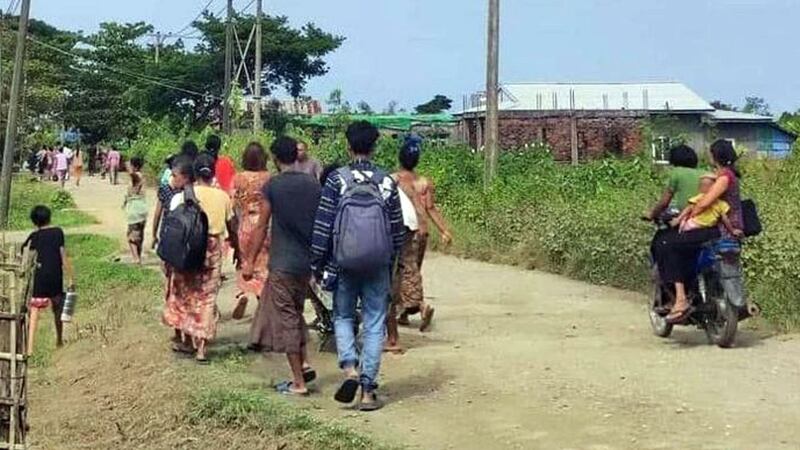Nearly 270,000 people have fled fighting in western Myanmar’s Rakhine state over the past three months since the ethnic Arakan Army ended a truce with the military, causing the number of those displaced by conflict in the region to jump more than five-fold, according to the AA.
Rakhine state has been the center of intense clashes since the AA ended a ceasefire in November that had been in place since the military seized power in Myanmar in a Feb. 1, 2021, coup d’etat. Junta troops have suffered heavy losses on the battlefield while the AA has gone on to capture six townships in the state.
The Humanitarian and Development Coordination Office of the United League of Arakan/Arakan Army said that 268,731 people fled fighting in Rakhine from Nov. 13 to Feb. 13, bringing to more than 330,000 the number displaced by conflict in the state from 62,332 before the end of the ceasefire.
They were displaced from 14 townships, the report said, including Sittwe, Mrauk-U, Kyauktaw, Minbya, and Pauktaw – areas that have seen some of the heaviest fighting in the state. More than 100,000 people were displaced from Pauktaw alone in the three-month period, the AA said.
An aid worker in Myebon township who, like others interviewed for this report, asked to remain anonymous due to security concerns told RFA Burmese that residents were compelled to flee amid intense bombardment by the military.
“Heavy weaponry rained down upon the villages, reducing homes to ashes,” he said. “As a consequence, our villagers no longer feel safe within our own territories and have sought refuge elsewhere … They are being sheltered by family members.”
The displaced are sheltering in villages and monasteries far away from the fighting, and lack access to adequate food and water, he said.
A resident of northern Rakhine state told RFA that most of the people who fled from cities to rural areas are facing a worsening food shortage.
"The urban population in Rakhine state outnumbers the rural population,” he said. “In the past, they went from the village to the city to escape war. But now, they are fleeing from the towns to rural areas. They are encountering challenges, and there are instances where access to food is also being disrupted."
‘Situation remains dire’
According to the AA, at least 111 civilians were killed and 357 injured by military artillery, aerial and naval fire, and landmines in the three months of fighting. Junta authorities also arrested at least 292 civilians during the period, it said.
Residents of Rakhine told RFA that the injured only have access to medical care in more remote rural villages, and that some patients are being cared for by AA personnel.

They also claimed that the more junta troops suffer losses on the battlefield, the more they have targeted civilians, leading to more casualties and displacement.
“I have witnessed instances of torture and the junta is increasingly arresting innocent people,” said one resident who has been monitoring the military situation in the state. “In addition, junta troops frequently deploy heavy weaponry. That's why these people are scared and run away.”
“The situation remains dire, with an increasing exodus of people seeking safety," he said.
Attempts by RFA to contact State Attorney General Hla Thein, the junta's spokesperson for Rakhine state, for a response to the AA's report and claims by residents went unanswered Tuesday.
Since the end of the ceasefire, the AA has captured seven townships, including Pauktaw, Minbya, Mrauk-U, Kyauktaw, Myebon, and Taung Pyo in Rakhine state, as well as Paletwa in neighboring Chin state.
The AA is currently engaged in an offensive against junta battalions in the Rakhine townships of Ramree, Buthidaung, Maungdaw, Rathedaung, and Ponnagyun.
Translated by Kalyar Lwin. Edited by Joshua Lipes and Malcolm Foster.
